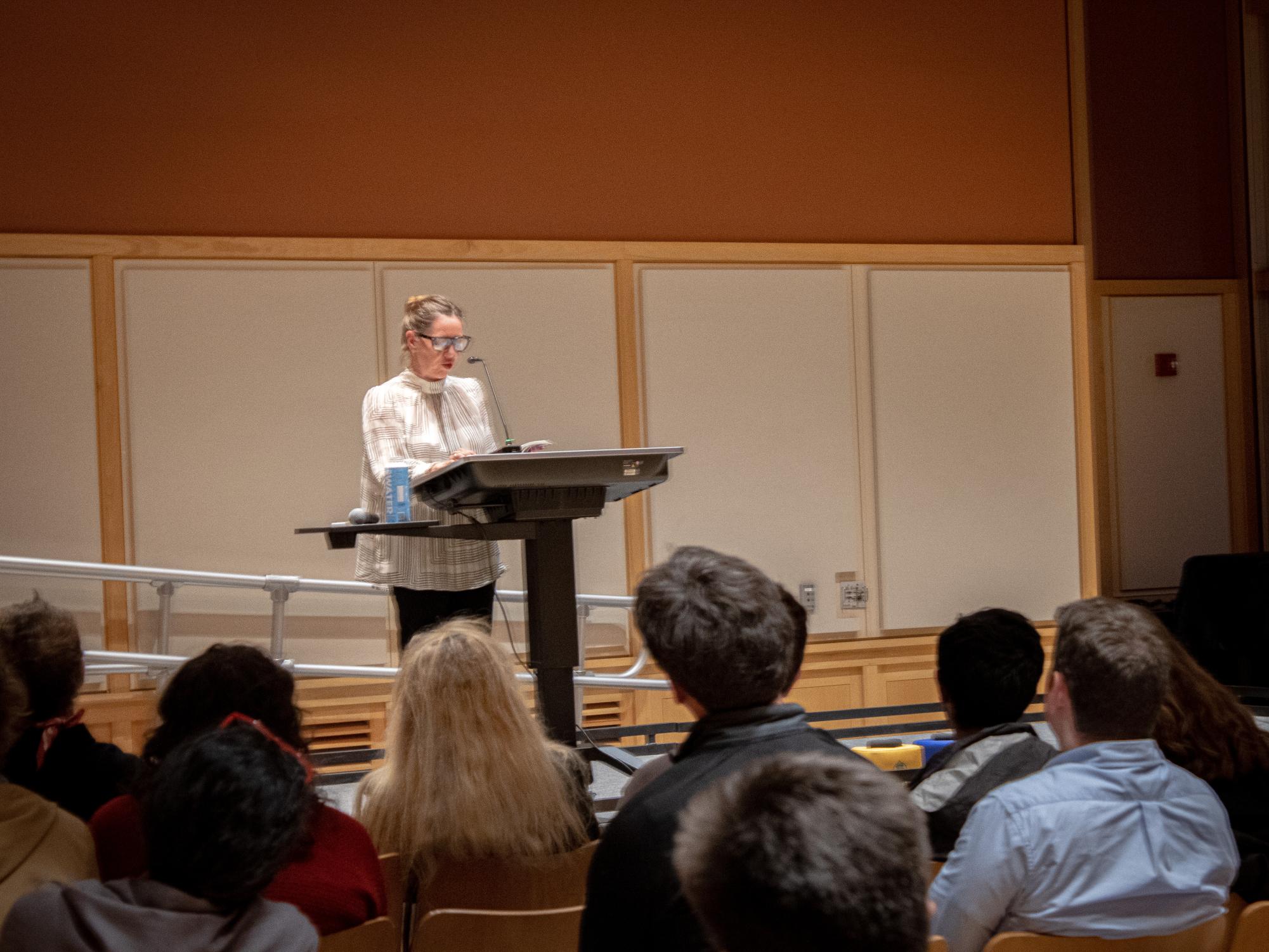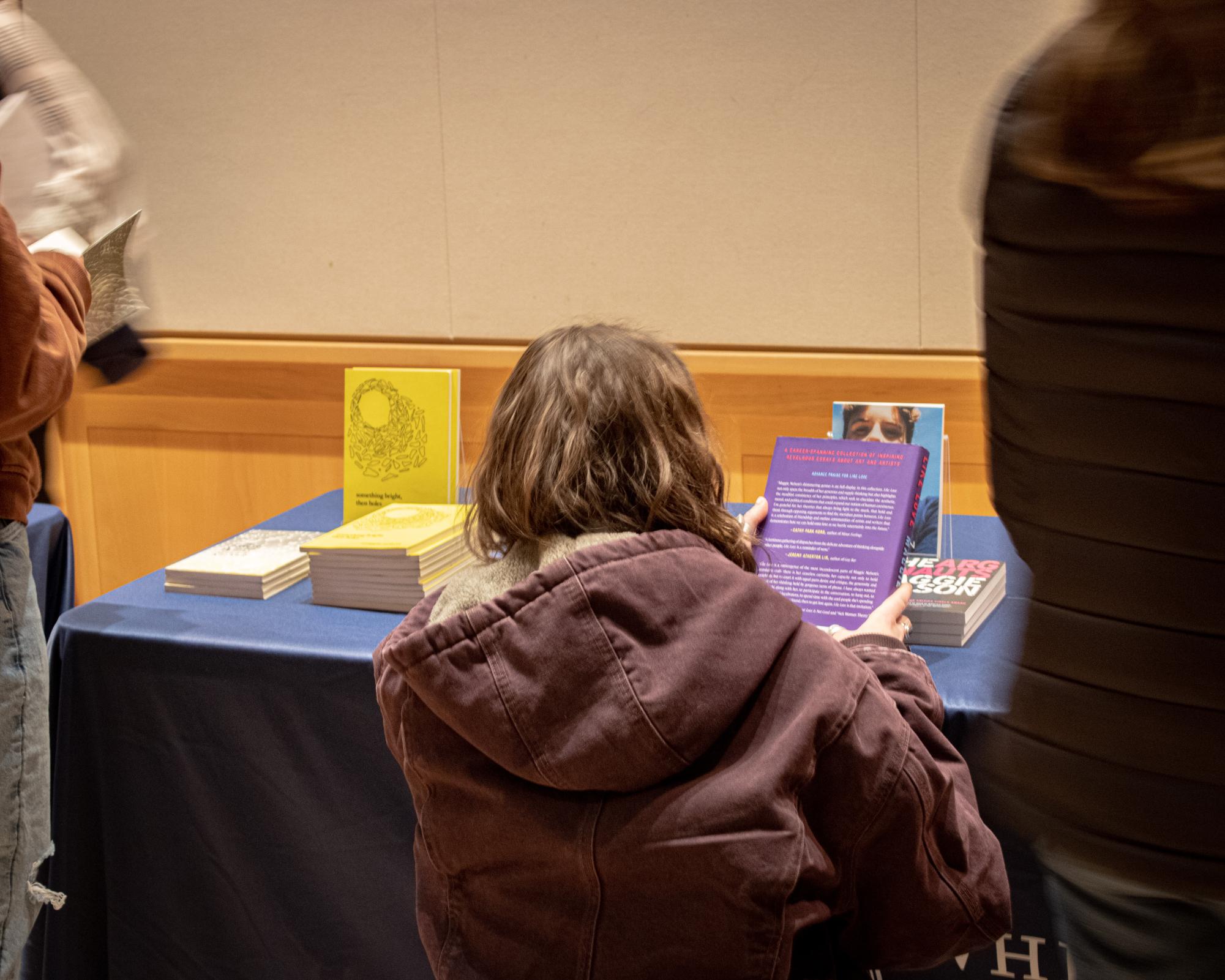
As members of the Whitman community ambled into Reid’s Ballroom on April 4, they were greeted with an offering of a screen printed original artwork made by students in collaboration with the Visiting Writers Reading Series. Looking at the print, it’s easy to get lost in the beautifully detailed artwork of an anatomical heart that fills the page with wave after wave of a soft, pastel blue. An excerpt from author Maggie Nelson’s book Bluets stands in bold black ink against the light background, pairing text and art to give each attendee a memento of the evening. Like the print, Nelson’s work is multidimensional and challenges traditional conventions of form and genre. Nelson’s visit to Whitman gave audience members a new, intimate way to engage in her work.
Katrina Roberts, Mina Schwabacher Professor of English, Creative Writing and Humanities and Director of the Visiting Writers Reading Series, explained that Nelson’s unique style captivates students.
“Of course, her writing is prolific, elegant, fierce, meditative, gritty, incisive and genre-spanning: essays, philosophical commentary, autobiography, poems, criticism, theory of aesthetics and hybrid works that interlace the personal and intellectual with the political in resonant and relevant webs of meaning across disciplines, so it’s no wonder her fan base is massive,” Roberts said.
Nelson’s reading marked a special occasion — her visit to Whitman happened just two days after the release of her latest book Like Love: Essays and Conversations. This timing meant that attendees got to hear the first live reading of the book, giving them a meaningful way to engage with Nelson’s work. Before diving into selected readings from the book, Nelson explained that its form was true to its title — rather than being a monolithic narrative, the novel consists of multi-voiced discussion and dialogue.
Like the book itself, Nelson’s reading also took on a dialogic form. After reading the Preface, Nelson invited a volunteer from the audience to read half of an email exchange between herself and correspondent Wayne Koestenbaum.
This unexpected moment of audience participation livened the reading and created an atmosphere of closeness and fun. For Thomas Nelson, a senior who attended the reading, the energy in the room made the evening memorable.
“I did like how she had a guest reader read one of those sections, I think ‘loosey goosey’ is a good phrase for it … she just made the whole crowd comfortable from the beginning,” Thomas Nelson said.
Sophomore Delilah Hartwell, who was called on stage to read, agreed with Thomas Nelson and said that getting the opportunity to participate directly with Nelson’s work was unforgettable.
“Reading onstage with Maggie Nelson was an incredible experience that I will never forget. She has a beautiful warm presence that commands the attention of all those around her. I was a bit nervous when I got up onto the stage, but after a few minutes by her side I was soothed,” Hartwell said. “I could feel her confidence and grace rubbing off on me and I left the reading exhilarated and deeply inspired.”

The close-knit sense of intimacy in the reading also provided opportunities for students to get a glimpse into Nelson’s artistic process. Senior Hanna Lynch explained how the question and answer period helped her get insight into how Nelson develops her literary style.
“At the reading, she delved into her process of assembling Bluets, writing a bunch of factoids and things she noticed on index cards and rearranging them. For me, the reading demonstrated how personal (and raw, at times) Nelson’s work is, which I admire,” Lynch said.
Roberts agreed, elaborating on how an author’s physical presence on campus can transform how readers engage with their work.
“One develops a sense of a writer from reading written works; but there’s nothing quite like having the chance to interact directly with writers in ‘real time/real life’; I love getting to know the people beyond the pages, and it’s such a delight and gift to be able to share these experiences with students and the greater community,” Roberts said.
For Hartwell, the presence of such an acclaimed author on campus helped provide a model for how to engage with challenging topics through writing.
“I felt like I got a peek behind the curtain of what it might be like to share myself and my experiences in a vulnerable way. Nelson writes in an authentic and honest fashion, and I hope to one day be able to share my own vulnerability with others,” Hartwell said.
Through an evening that explored love, sexuality, theory and creation itself, those who got the opportunity to see Nelson’s live reading left with a new understanding of her artistry as well as a physical memento of the evening.
